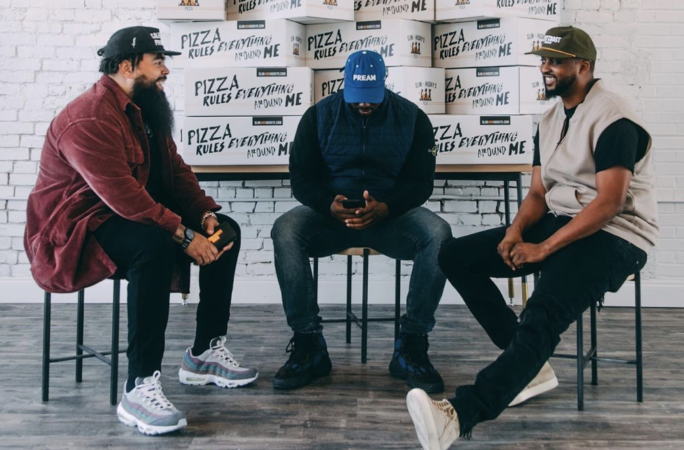A wise woman once said, “If at first, you don’t succeed, dust yourself off and try again.” And while the late Aaliyah was hinting at an exchange between her and a potential suitor, the same applies when it comes to shooting your shot as an entrepreneur — just ask the founders of Slim & Husky’s Pizza Beeria.
Before their pizza shop came to fruition, Derrick Moore, Clint Gray, and Emmanuel “EJ” Reid launched a moving company that was community-based with a huge focus on giving back.
“What’s crazy is when we first opened up, it was stemming from the sale of our initial business, which was a moving company,” Gray told Will Lucas during an appearance on Black Tech Green Money podcast. “And our moving company was community-based. We were hiring our friends that had been incarcerated and we had a big focus on giving back to our people and giving them jobs and providing opportunities.”
Now, Slim & Husky’s — a fast, casual artisan pizza shop that infuses their love of Hip-Hop and R&B culture — has soared far beyond its home base of Nashville, TN.
The establishment is now available in other Tennessee cities like Antioch, Chattanooga, Memphis, and Murfreesboro. Slim & Husky’s is also located in Atlanta, GA, and even Sacramento, CA.
Slim & Husky’s isn’t like your average pizza shop though. The ultimate vision has always been to be a place that authentically reflects the culture.
“We wanted to basically put our story, our culture, everything that, you know, creates the Black experience, on our walls,” Moore explained. “We felt like there was room for a concept and restaurant brand, not just the pizza, but something that told the story of Black culture in a high-end way.”
Moore continued: “The only thing Italian about our concept is the pizza. Everything else is 100 percent African American culture and our way to tell that story to the world.”
It has never solely been about the money for the trio.
Even when they launched their moving company with just $3,000, the sentiment was the same — provide the community with something that can help them build together.
“We were 25 when we started our first company and we started that company with $3,000. So, we were naive enough to think that this would work — and it did,” said Gray. “We just wanted to solve a problem. We saw a need. It’s not like we were passionate about moving furniture, but we had a passion for being entrepreneurs, and we had a passion for solving problems and filling a void and a need.”


